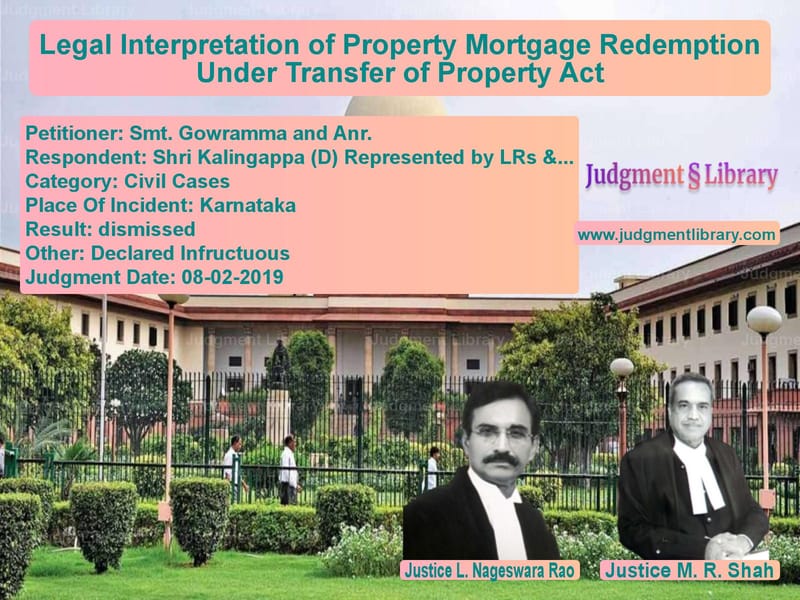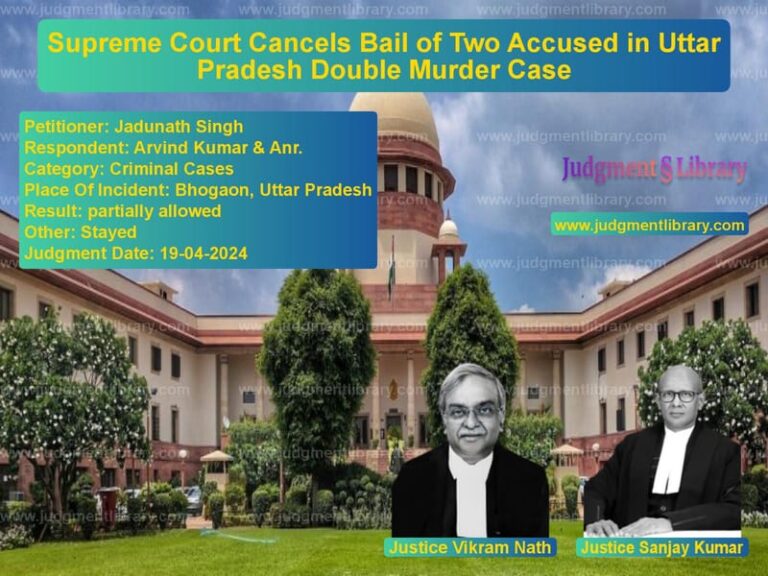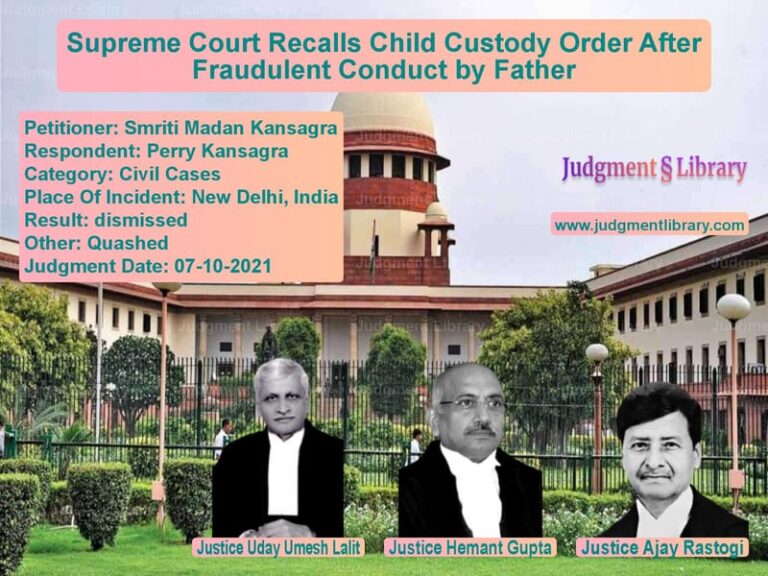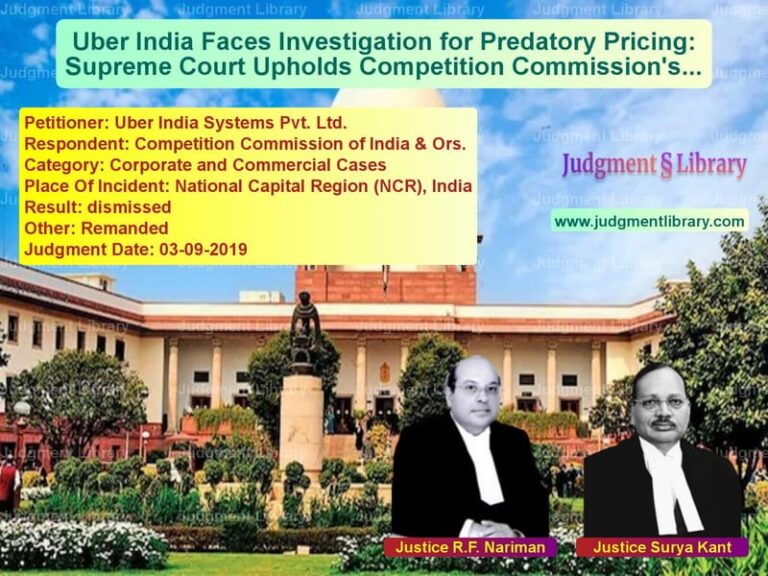Legal Interpretation of Property Mortgage Redemption Under Transfer of Property Act
The Supreme Court, in the case of Smt. Gowramma and Anr. vs. Shri Kalingappa (D) Represented by LRs & Ors., ruled on a significant property dispute involving the redemption of a mortgage and the right to reclaim property under Section 60 of the Transfer of Property Act, 1882. This case addressed a long-standing legal battle between the plaintiffs (mortgagors) and the respondent (mortgagee’s legal heirs), determining whether the right of redemption could still be exercised after an alleged act of extinguishment by the parties.
Background of the Case
The dispute originated when the appellants, Smt. Gowramma and Anr., mortgaged a piece of land in favor of Bangarasetty in 1980 for a sum of Rs. 3,000, with possession given to the mortgagee. In 1982, the appellants entered into an agreement to sell the land to Kalingappa for Rs. 6,000. Subsequently, Kalingappa filed a suit for specific performance in 1983 (OS No. 48 of 1983), which was decreed in his favor.
However, during the intervening period, the original mortgagee, Bangarasetty, assigned his rights to another person, Sundarasetty, who took possession of the property. Later, Kalingappa paid Rs. 3,000 to Sundarasetty and took possession of the land, claiming that the mortgage was thereby redeemed and extinguished.
Years later, in 2002, the appellants initiated a lawsuit (OS No. 45 of 2002) seeking redemption of the mortgage and possession of the land. The trial court ruled in their favor, ordering the return of the property upon repayment of the mortgage amount. This decision was upheld by the first appellate court. However, the Karnataka High Court, in 2011, overturned the lower court rulings, holding that the mortgage had been extinguished when Kalingappa paid the mortgage amount and obtained possession.
Arguments by the Petitioners (Smt. Gowramma and Anr.)
- The mortgage was not legally extinguished as per Section 60 of the Transfer of Property Act.
- No formal endorsement (Shera) was made on the mortgage deed or a written acknowledgment obtained regarding the redemption.
- Their right to redeem the mortgage survived because Kalingappa’s decree for specific performance was never executed.
- The lower courts had correctly ruled in their favor, and the High Court erred in reversing those findings.
Arguments by the Respondents (Legal Heirs of Kalingappa)
- The mortgage was effectively extinguished when Kalingappa paid the amount to Sundarasetty and obtained possession.
- As per the proviso to Section 60 of the Transfer of Property Act, an act of the parties can extinguish a mortgage.
- The plaintiffs had no subsisting right to redemption after the property had been transferred into possession of Kalingappa.
- The High Court correctly interpreted the law and dismissed the appellants’ claim.
Supreme Court’s Analysis and Judgment
The Supreme Court carefully examined the provisions of the Transfer of Property Act and prior judicial precedents. The key question before the Court was whether the mortgage had been legally extinguished through the payment made by Kalingappa.
Referring to Section 60 of the Transfer of Property Act, the Court observed:
“A mortgagor has the right to redeem the mortgage unless that right has been extinguished by act of the parties or a decree of the court. The Proviso to Section 60 makes it clear that an agreement between the mortgagor and mortgagee can lead to such extinguishment.”
The Court further emphasized:
“It is evident from the record that the mortgagee assignee, Sundarasetty, received Rs. 3,000 from Kalingappa and put him in possession of the land. This act constitutes an extinguishment of the mortgage by conduct of the parties, as envisaged in Section 60.”
On the question of whether an endorsement was required to confirm extinguishment, the Court ruled:
“While a formal endorsement or written acknowledgment is one way of proving redemption, it is not the sole criterion. The act of redemption can be inferred from the conduct of the parties. In this case, the payment and possession transfer constitute sufficient proof of extinguishment.”
Accordingly, the Supreme Court upheld the Karnataka High Court’s ruling, dismissing the appellants’ claims and affirming that the mortgage had been extinguished.
Implications of the Judgment
- Reinforcement of Legal Principles: This case clarifies that redemption of a mortgage does not always require a written acknowledgment if there is clear evidence of an act of extinguishment.
- Importance of Possession Transfer: The ruling highlights that possession transfer following mortgage payment can serve as conclusive evidence of redemption.
- Guidance for Future Property Disputes: The case serves as a precedent for similar disputes where mortgages are claimed to be extinguished by acts of the parties.
In conclusion, the Supreme Court’s judgment reinforces that the right of redemption under Section 60 of the Transfer of Property Act must be exercised within its legal limits. The decision provides a landmark interpretation of how mortgage extinguishment can be inferred through conduct and not necessarily through formal documentation.
Petitioner Name: Smt. Gowramma and Anr..Respondent Name: Shri Kalingappa (D) Represented by LRs & Ors..Judgment By: Justice L. Nageswara Rao, Justice M. R. Shah.Place Of Incident: Karnataka.Judgment Date: 08-02-2019.
Don’t miss out on the full details! Download the complete judgment in PDF format below and gain valuable insights instantly!
Download Judgment: Smt. Gowramma and An vs Shri Kalingappa (D) Supreme Court of India Judgment Dated 08-02-2019.pdf
Direct Downlaod Judgment: Direct downlaod this Judgment
See all petitions in Contract Disputes
See all petitions in Property Disputes
See all petitions in Judgment by L. Nageswara Rao
See all petitions in Judgment by Mukeshkumar Rasikbhai Shah
See all petitions in dismissed
See all petitions in Declared Infructuous
See all petitions in supreme court of India judgments February 2019
See all petitions in 2019 judgments
See all posts in Civil Cases Category
See all allowed petitions in Civil Cases Category
See all Dismissed petitions in Civil Cases Category
See all partially allowed petitions in Civil Cases Category







